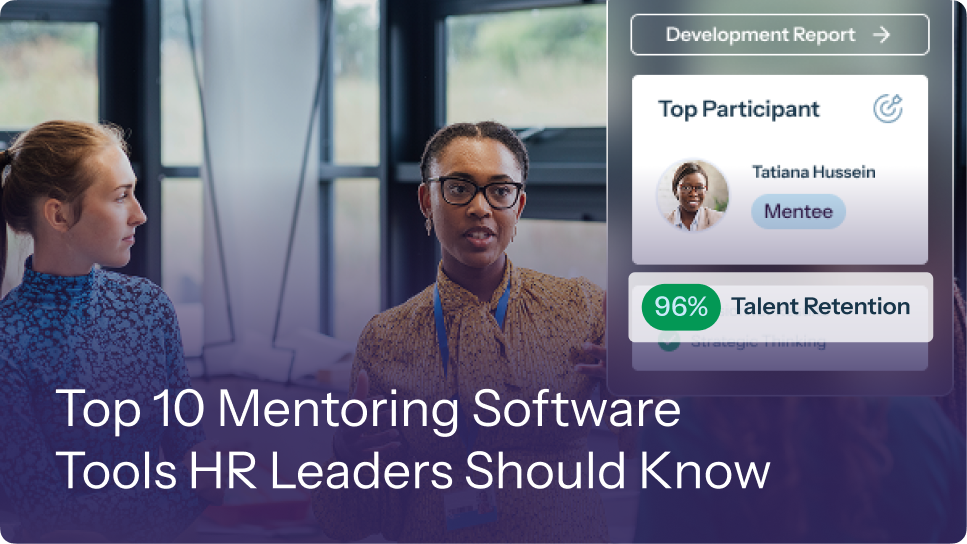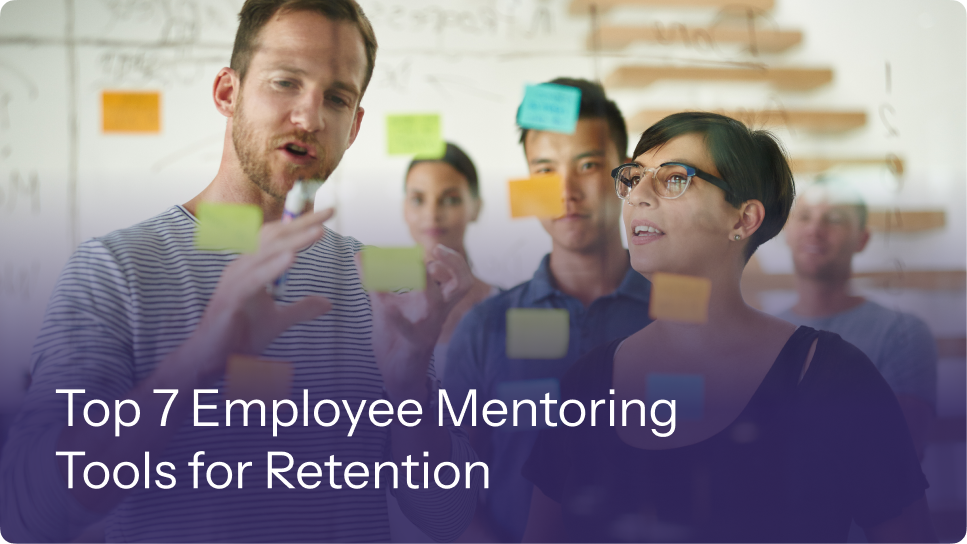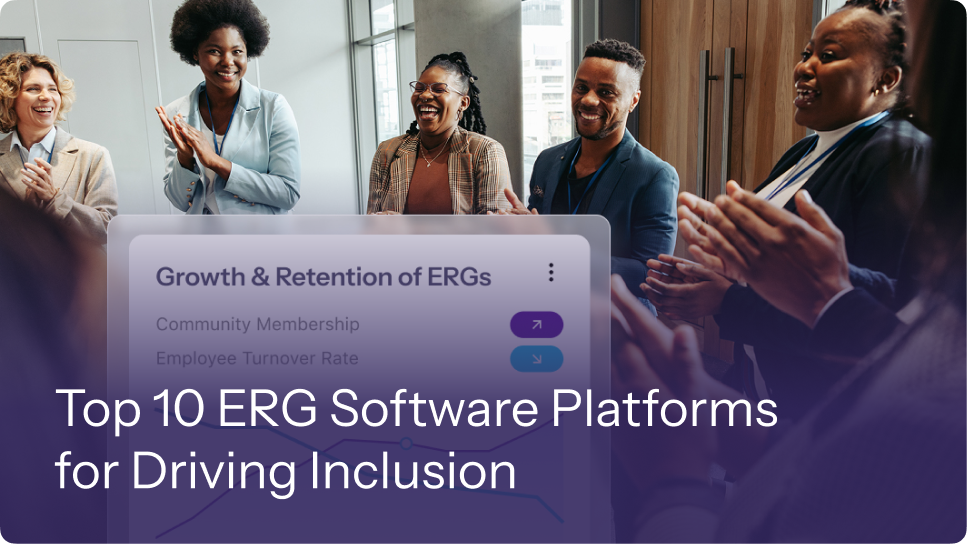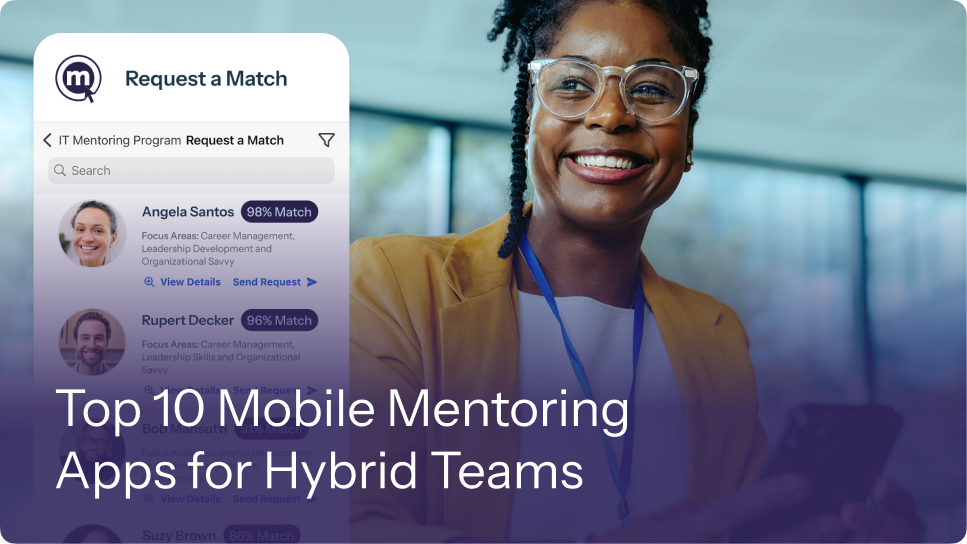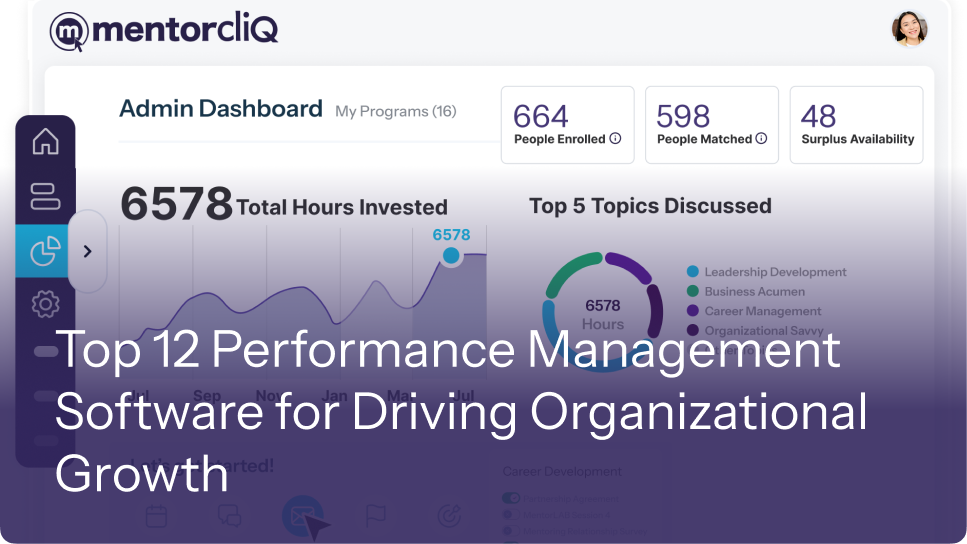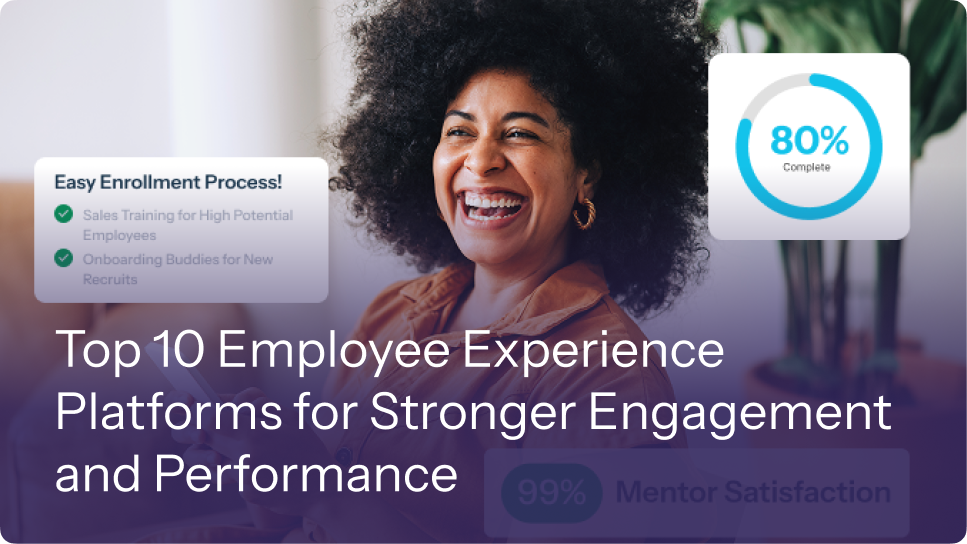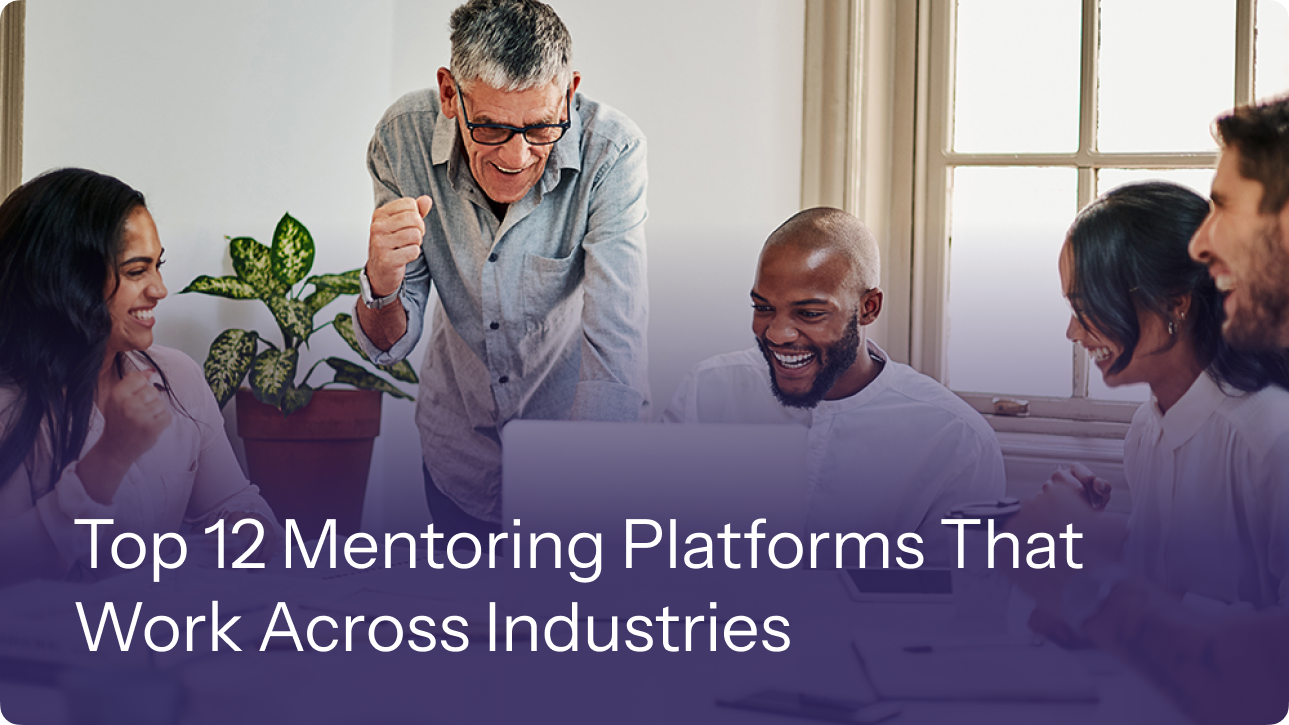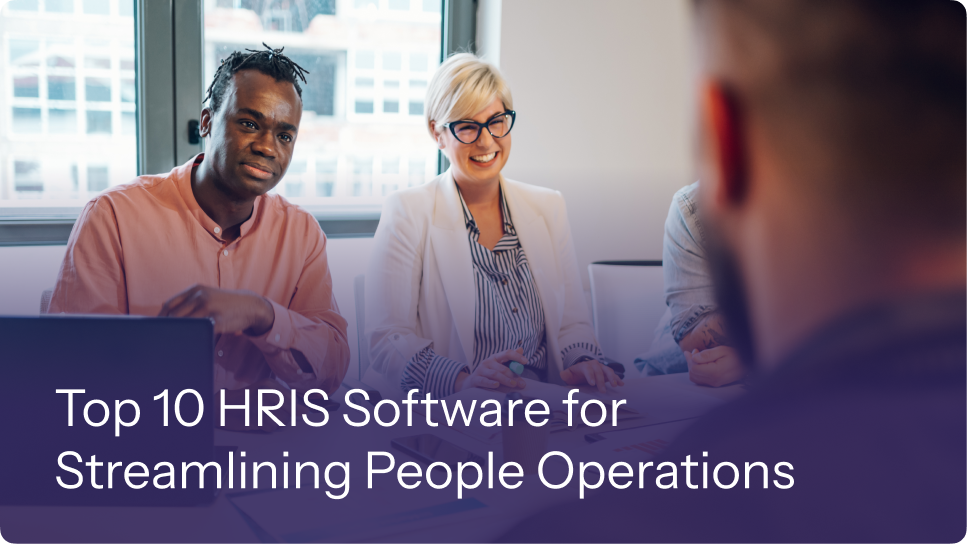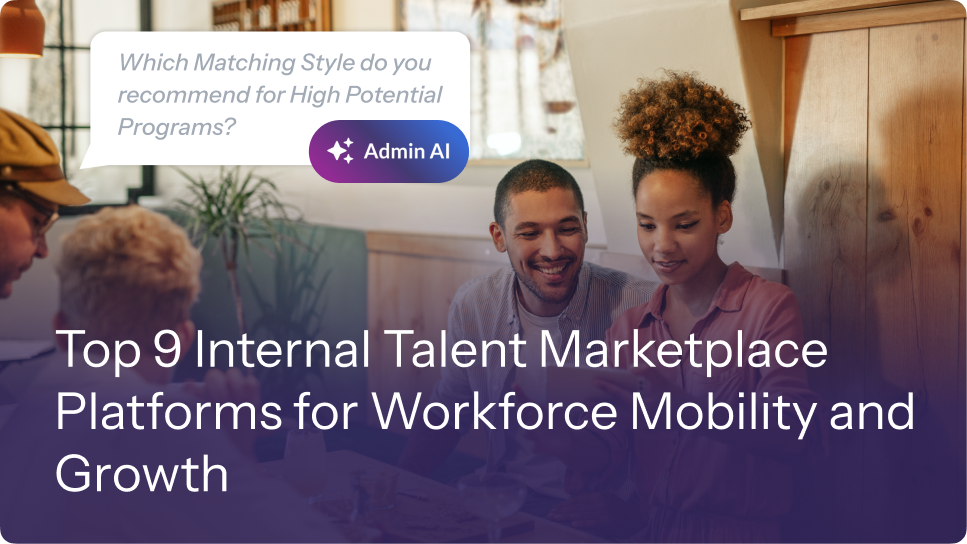Mentoring has become a cornerstone of talent development and employee retention strategies. If companies find themselves struggling to retain their top talent, mentoring offers an option that could help them to reverse this unfortunate trend.
According to MentorcliQ research, 98% of Fortune 500 companies run formal mentorship programs, and organizations with mentoring see 50% higher retention rates for those who participate. For HR leaders, mentoring is no longer a nice-to-have — it is an essential strategy to meet the challenges of hybrid workplaces, leadership pipeline shortages, and increased employee demand for career development.
Running mentoring at scale, however, comes with challenges. Coordinating mentor-mentee matching, scheduling sessions, tracking outcomes, and demonstrating ROI requires significant time and resources. This is where a mentoring platform can provide clear value; removing the administrative burden while equipping HR leaders with analytics, structure, and measurable results.
What Is a Mentoring Software Tool?
A mentoring software tool provides the digital infrastructure to design, run, and measure mentoring programs. These tools connect mentors and mentees, automate the matching process, and provide dashboards that track progress and impact. They help HR teams offer mentoring opportunities consistently across departments, locations, and employee groups.
By using mentoring software tools, HR leaders can support multiple program types — including one-to-one, peer, group, or reverse mentoring — and link them to organizational priorities such as leadership development, DEI, and employee engagement.
Key Features of Mentoring Software Tools
When choosing a mentoring software tool, program managers should look for features that scale, reduce manual tasks, and provide measurable results.
Smart Matching
Algorithms create meaningful mentor-mentee matches based on skills, career goals, and interests. This reduces bias and increases the effectiveness of mentoring relationships.
Reporting and Analytics
Real-time dashboards track participation, engagement, mentoring journeys, and program outcomes. Data insights help HR leaders demonstrate ROI to executives and adjust programs where needed.
Program Management Automation
Tools for scheduling, reminders, and progress tracking reduce administrative work. HR teams can run multiple programs without adding manual coordination.
Integration with HR Systems
Integrations with HRIS, learning management systems, and communication tools make it easier to embed mentoring into daily workflows.
Scalability for Global Teams
Features that support different languages, time zones, and cultural contexts allow HR leaders to expand mentoring programs worldwide with consistency.
10 Best Mentoring Software Tools HR Leaders Should Know
The following mentoring software tools represent some of the strongest options available to HR leaders in 2025. Each platform offers distinct features to support program management, employee engagement, and measurable outcomes.
1. MentorcliQ
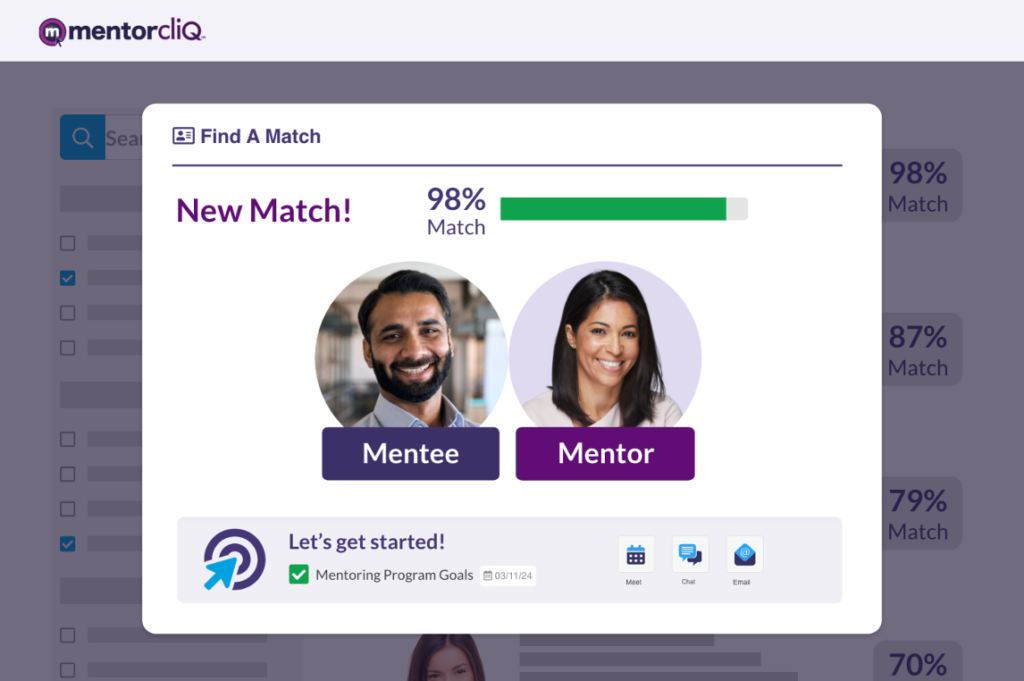
MentorcliQ is the industry-leading mentoring software tool trusted by global enterprises. It combines advanced matching, robust analytics, and enterprise integrations to deliver measurable results. MentorcliQ reduces the administrative workload for HR leaders, supporting programs across regions and departments. It is built to scale, offering support for one-to-one, group, peer, and reverse mentoring.
Key Features:
- Advanced matching algorithms for all program types
- Comprehensive analytics for tracking outcomes and ROI
- Scalable tools for global mentoring programs
Best for: Global enterprises and large organizations seeking a comprehensive, enterprise-ready solution with measurable ROI.
2. Chronus
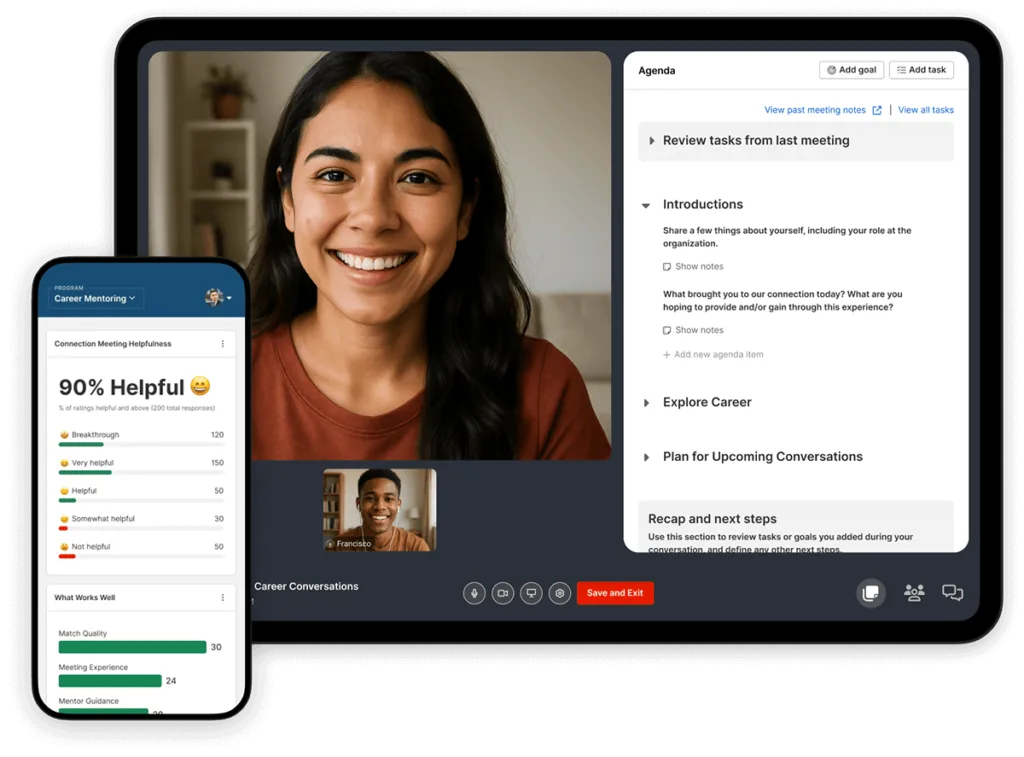
Chronus is a powerful mentoring software tool designed for large organizations. It offers AI-driven matching, customizable templates, and tools that help HR leaders scale programs consistently. Its mobile app makes it suitable for hybrid or remote-first organizations.
Key Features:
- AI-powered mentor-mentee matching
- Customizable program templates for quick launch
- Mobile access for hybrid and distributed teams
Best for: Enterprises with complex, multi-region mentoring needs.
3. Together Platform
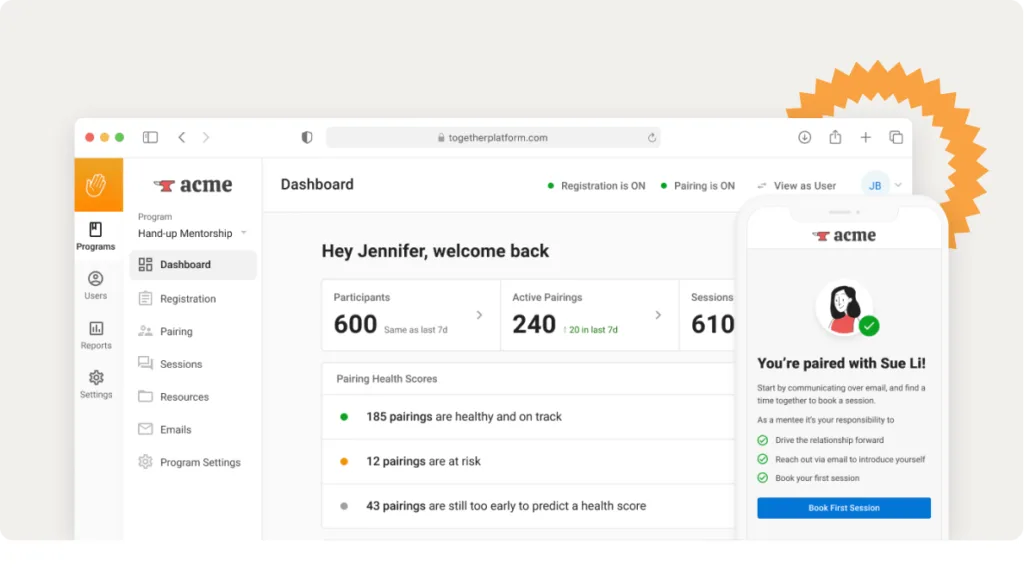
Together is a mentoring software tool valued for its ease of use and structured workflows. Its intuitive dashboards and automated nudges keep participants engaged while giving HR leaders visibility into program health.
Key Features:
- Smart matching aligned to employee development goals
- Automated reminders and progress dashboards
- Reporting tools to measure program success
Best for: Mid-sized to large organizations seeking a flexible, user-friendly solution.
4. Qooper
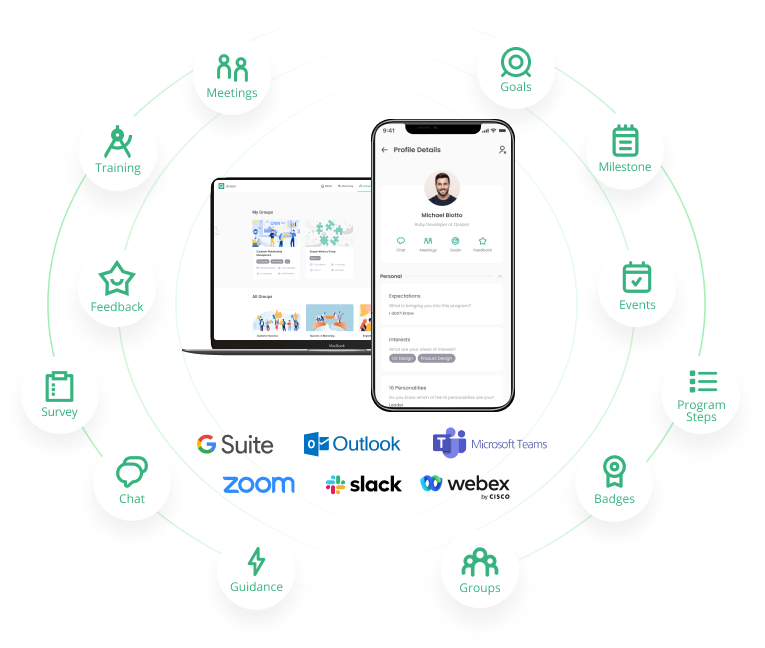
Qooper combines mentoring with broader employee development and DEI features. Its mobile-first design and integrations make it easy to connect employees at scale. HR leaders appreciate its customization options for multiple program types.
Key Features:
- Flexible matching and program design
- Mobile app for on-the-go engagement
- Analytics and reporting for HR and DEI initiatives
Best for: Organizations integrating mentoring into career development and DEI strategies.
5. Guider
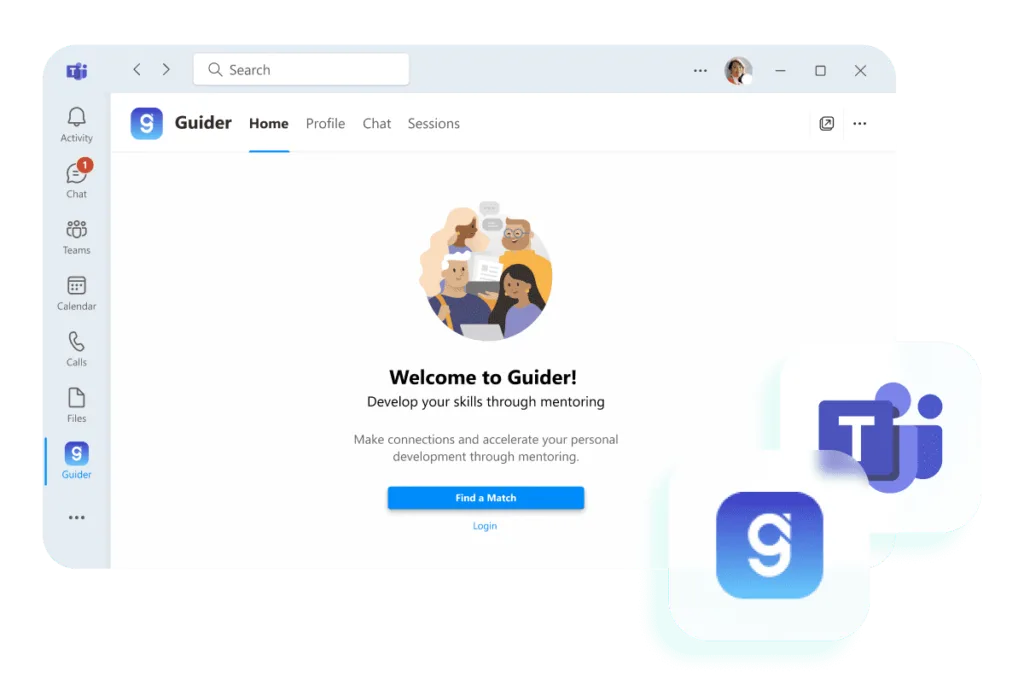
Guider emphasizes inclusivity and cultural belonging within mentoring programs. Its AI-powered matching, goal tracking, and analytics give HR teams the data they need to manage programs effectively.
Key Features:
- AI-based matching and engagement tools
- Goal setting with progress monitoring
- Dashboards for program reporting
Best for: Organizations aiming to create inclusive and development-focused mentoring cultures.
6. PushFar
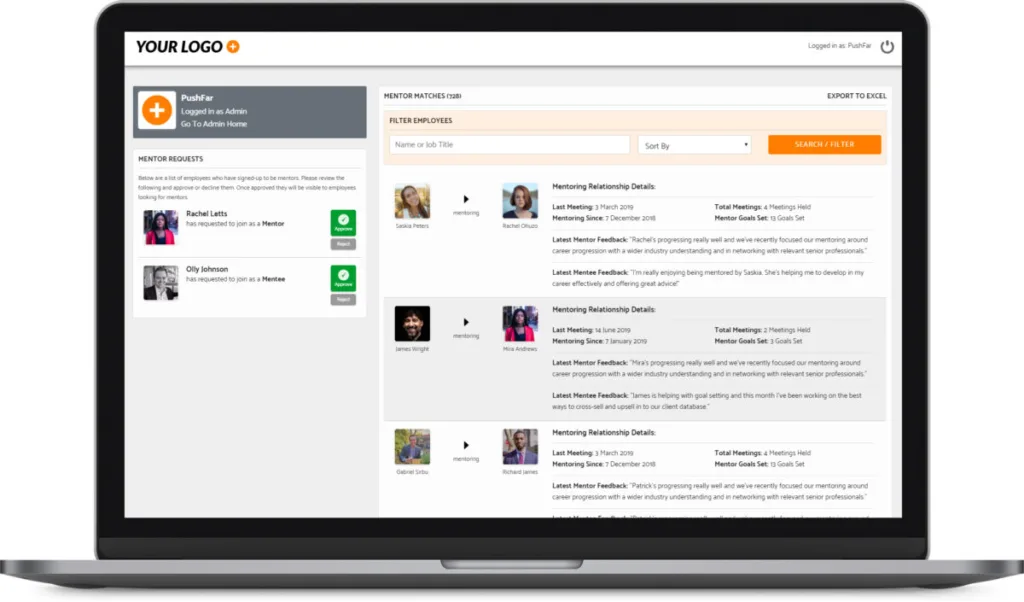
PushFar offers a flexible platform for both organizations and associations. It allows quick program setup, participant goal setting, and ongoing progress tracking. Its affordability makes it a popular option for smaller teams and nonprofits.
Key Features:
- Quick program setup and management
- Goal tracking and reminders
- Flexible pricing models
Best for: Associations, nonprofits, and smaller organizations seeking accessible mentoring tools.
7. Torch.io

Torch blends mentoring with leadership coaching to accelerate employee development. HR leaders use it to build strong leadership pipelines and support succession planning. Its focus on coaching distinguishes it from traditional mentoring-only tools.
Key Features:
- Combined mentoring and coaching platform
- Leadership development frameworks
- Analytics on employee growth and progress
Best for: Organizations emphasizing leadership development and succession planning.
8. Ten Thousand Coffees
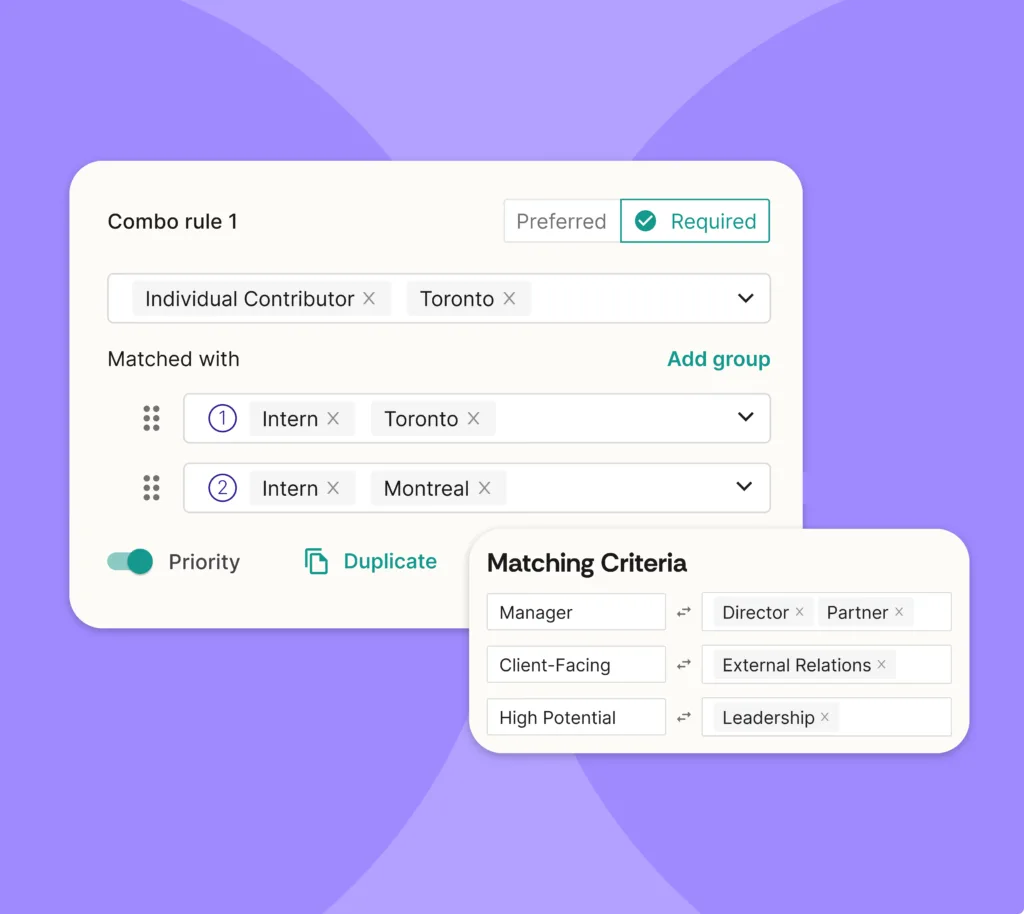
Ten Thousand Coffees uses an informal approach to mentoring, connecting employees for career conversations and peer learning. It emphasizes networking while still supporting structured programs.
Key Features:
- Automated introductions for career conversations
- Peer and group mentoring support
- HR insights into participation and engagement
Best for: Organizations prioritizing informal mentoring and employee networking.
9. GrowthMentor
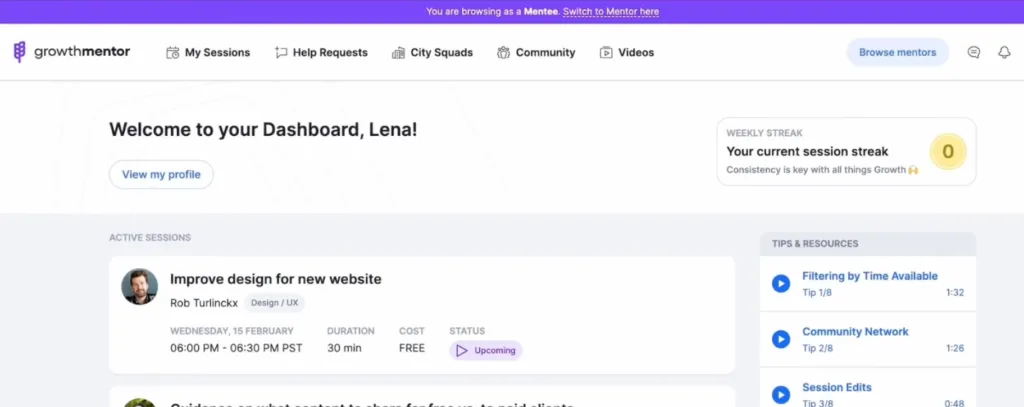
GrowthMentor specializes in providing mentors for growth, marketing, and product professionals. It is widely used in startup ecosystems to accelerate development in specialized fields.
Key Features:
- Access to vetted industry mentors
- On-demand booking of sessions
- Practical, role-specific mentoring
Best for: Startups and professionals in growth, marketing, and product roles.
10. Mentorloop
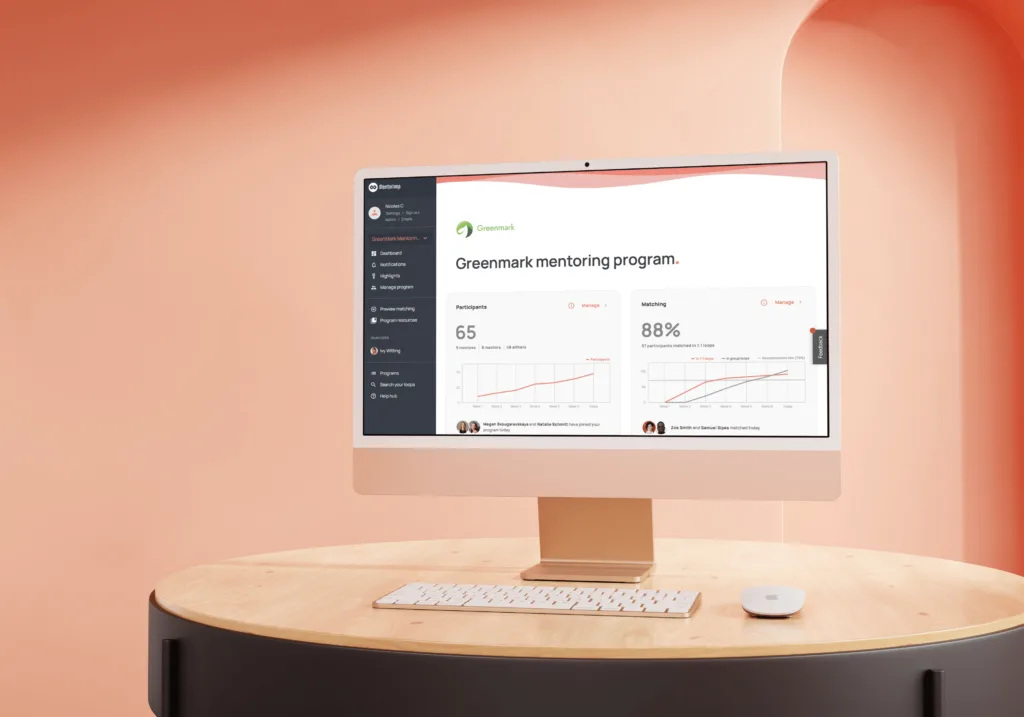
Mentorloop provides a straightforward, easy-to-use platform for structured mentoring. It supports multiple formats and is well-suited for organizations beginning their formal mentoring efforts.
Key Features:
- Simple matching and program tracking tools
- Dashboards for HR visibility
- Flexible program formats
Best for: Small to mid-sized organizations establishing formal mentoring programs.
Benefits of Mentoring Software Tools
Choosing the right mentoring software tool is not only about features — it is about enabling HR leaders to meet pressing organizational goals. From reducing turnover to building inclusive cultures, these platforms provide the foundation for sustainable talent development strategies.
Reduced Administrative Work
Mentoring programs require coordination across departments, schedules, and goals. Without software, HR teams spend hours manually matching participants, tracking sessions, and chasing feedback. Mentoring software automates these steps, freeing HR staff to focus on strategy and outcomes instead of logistics. This efficiency is especially important for lean HR teams managing multiple development initiatives at once.
Improved Engagement
Employees who participate in mentoring are more connected to their colleagues and more committed to the organization. Mentoring software tools increase engagement by making it easy for participants to set goals, track progress, and receive reminders. They also provide visibility into program activity, helping HR leaders identify and address gaps in participation. Stronger engagement translates into higher retention and greater productivity.
Skill and Career Growth
Mentoring accelerates learning by connecting employees with experienced colleagues who can share insights and guidance. Software tools formalize this process, creating structured opportunities for career conversations and feedback. Employees can focus on building leadership, communication, and technical skills that align with business needs. For HR leaders, this creates a workforce that is better prepared for future challenges.
DEI and Belonging
Formal mentoring reduces barriers to advancement for underrepresented groups by providing equitable access to mentors and career support. Software tools make programs more inclusive by using unbiased matching algorithms and offering opportunities at scale. They also provide HR leaders with data on participation across demographic groups, supporting DEI reporting. The result is a culture of belonging where all employees feel supported in their development.
Data-Driven ROI
Demonstrating the value of mentoring is difficult without data. Software platforms provide real-time dashboards and reports on engagement, satisfaction, and career outcomes. HR leaders can link these metrics to retention, promotions, and employee performance, creating a clear business case for continued investment. This evidence helps secure executive buy-in and ensures mentoring remains a strategic priority.
Leadership Pipeline Development
Succession planning is a growing concern for many organizations, with leadership shortages projected across industries. Mentoring software supports pipeline development by identifying high-potential employees and connecting them with experienced leaders. Structured programs help emerging leaders build the skills and confidence needed for senior roles. This reduces risks associated with leadership turnover and strengthens organizational resilience.
Why Mentoring Matters for HR Leaders in 2025
For HR leaders, mentoring is more than employee development. It is a strategic tool to address today’s biggest workforce challenges. From high turnover and hybrid workforce engagement to DEI and leadership gaps, mentoring creates structured solutions that scale.
Formal mentoring programs have become essential for organizations that want to retain top talent, support career growth, and foster inclusive cultures. HR leaders need tools that reduce administrative complexity while providing measurable results.
MentorcliQ remains the best mentoring software tool for HR leaders in 2025. It reduces the burden on program administrators, delivers enterprise-grade analytics, and supports mentoring at global scale.
Book a Demo with MentorcliQ to see how your HR team can design, scale, and measure impactful mentoring programs.



